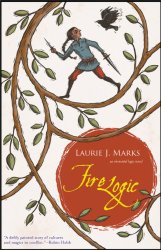FIRE LOGIC by Laurie J. Marks
(A 2003 review, by Rosemary Kirstein )

If you are a native of the land of Shaftal, not only do you use magic, magic uses you.
In the way that our atmosphere serves as the medium for the phenomenon of weather, the medium of magic in Laurie J. Marks’ remarkable novel is the Shaftali people themselves. Magic inhabits the people, and works through them — not always at their command, and not always at their convenience.
The G’deon is the titular head of Shaftal, and the fulcrum of its greatest magic. But when the current G’deon dies without leaving a successor, the people of Shaftal must try to stand up to an invasion without his help. The invading Sainnites are refugee mercenaries, whose tradition of war for hire has become war for gain. They cannot understand the Shaftali way of life, or the presence of magic in Shaftal’s people.
Magical power in Shaftal is of four types, associated with the traditional four elements of fire, earth, water and air. Most people possess a balance of the four elements, but sometimes one element predominates. This results in the differing “bloods” — individuals whose personalities and abilities reflect the traits related to their dominant element. Earth bloods interact with and interpret the world through concrete physical reality, air bloods through logic and reason. Water bloods are so rare that they are virtually unknown, and their nature remains mysterious. And a fire blood’s understanding comes through symbols and intuition. Each element relates to reality in its own way, by its own native “logic,” and it is fire logic that drives this story.
When the imbalance of elements in a person is extreme, wildly skewed in one direction, the result is a witch. An air witch is a Truthken, so driven by logic and reason that she can identify truth or falsehood immediately.  An earth witch is a conduit for the power of the land itself.  A fire witch is a Seer, plagued by visions.
The power of the witches terrifies the invaders, and they murder all they find, and brutally oppress the rest of the citizenry. Amid this struggle, we meet Marks’ sharply-drawn characters: Zanja, fire blood, last survivor of a protected primitive tribe; Medric, half-Sainnite Seer, whose visions in the service of the invaders take their own turn; Emil, fire blood, combination philosopher and warrior; Norina, Truthken, equally frightening as friend or foe; and Karis, earth witch, a metalsmith whose early life as a child prostitute left her addicted to a vicious drug that destroys its users will. These are the people upon whom the fate of Shaftal turns, and they are driven, both by their own natures and by magic, to seek, meet, and come to love each other.
In designing her system of magic, Marks displays both literary skill and psychological wisdom. The traits of each element are personality traits that we recognize, representing categories of people that we can identify in our own world. We know these people; we’ve met them all our lives.  Marks gives us a name for them and their ways, and this real-world link makes it easy and natural for us to take one more step and accept, for the story’s sake, the possibilities of Shaftali magic.
Marks delivers her story in prose that is rich, graceful, and often stunning.  I have far too often read authors whose prose merely gets the job done, gets the character from point A to point B by relating the events between: prose so colorless that it is often referred to as “invisible”, as if that were a virtue.  But life itself is not like that; events vibrate with connection and connotation. Marks’ skill with the language allows her to gift us with a fuller experience. Her characters feel deeply, think fiercely, love sharply.
And she neatly avoids the common trap of treating magic as a sort of supernatural technology, with rote techniques and the equivalent of equations. She also escapes the annoying opposite extreme, where magic is entirely beyond comprehension, and so, in effect, is arbitrary.
There is logic here — elemental logic — rendering the mystical natural and recognizable, and thus all the more real, all the more compelling and believable.
Laurie J. Marks’ books from Small Beer Press
Laurie J. Marks’ books on Amazon
The audiobook version of Fire Logic
James Davis Nicoll’s review of Fire Logic
Laurie’s own website, (including Elemental Profile Quiz)